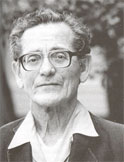|
 Benjamin
Libet was born on April 12th, 1916 in Chicago, Illinois.
He studied Physiology at the University of Chicago and graduated
with a Ph.D. in Physiology in 1939. In his dissertation he
worked on "Electrical activity of the isolated frog brain" under
the supervision of Ralph W. Gerad. Between 1945 and 1948 he
worked as an Assistant Professor at the University of Chicago.
In 1956, he was working together with Sir John Eccles (Nobel
Laureate in Physiology) in Canberra, Australia. In the course of
his academic career he was Lecturer at the Albany Medical
College, New York, Research Fellow at the Institute of the
Pennsylvania Hospital, Philadelphia (in Neurochemistry), and
Instructor at the University of Pennsylvania Medical School.
Today, Libet is active as Professor Emeritus at the Medical
Center of the University of California, San Francisco, and at
the Center for Neuroscience of the University of California,
Davis. Benjamin
Libet was born on April 12th, 1916 in Chicago, Illinois.
He studied Physiology at the University of Chicago and graduated
with a Ph.D. in Physiology in 1939. In his dissertation he
worked on "Electrical activity of the isolated frog brain" under
the supervision of Ralph W. Gerad. Between 1945 and 1948 he
worked as an Assistant Professor at the University of Chicago.
In 1956, he was working together with Sir John Eccles (Nobel
Laureate in Physiology) in Canberra, Australia. In the course of
his academic career he was Lecturer at the Albany Medical
College, New York, Research Fellow at the Institute of the
Pennsylvania Hospital, Philadelphia (in Neurochemistry), and
Instructor at the University of Pennsylvania Medical School.
Today, Libet is active as Professor Emeritus at the Medical
Center of the University of California, San Francisco, and at
the Center for Neuroscience of the University of California,
Davis. |
|
In 1979, Libet attempted his
perhaps most ambitious, but certainly most spectacular trial to
trace the unconditionally free will, unbound by matter or any
other general framework (published and discussed in a seminal
paper in Behavioral & Brain Sciences in 1985). He showed that
consciousness emerges in the brain within a characteristic onset
or delay of 300-1000 ms. With his ground-breaking (and still
vigorously discussed) work, Libet demonstrated that phenomena of
consciousness are scientifically accessible, and rang in a new
area for Psychology and the Cognitive Neurosciences.
(Carmen
Morawetz) |
|
Instead of the legendary "call from Stockholm", the Psychology
Laureate receives the pioneering "Letter from Klagenfurt". Here
you can find the
Letter
to Libet and the reply of the Laureate, the
Letter of Acceptance.
|
|
 Benjamin
Libet was born on April 12th, 1916 in Chicago, Illinois.
He studied Physiology at the University of Chicago and graduated
with a Ph.D. in Physiology in 1939. In his dissertation he
worked on "Electrical activity of the isolated frog brain" under
the supervision of Ralph W. Gerad. Between 1945 and 1948 he
worked as an Assistant Professor at the University of Chicago.
In 1956, he was working together with Sir John Eccles (Nobel
Laureate in Physiology) in Canberra, Australia. In the course of
his academic career he was Lecturer at the Albany Medical
College, New York, Research Fellow at the Institute of the
Pennsylvania Hospital, Philadelphia (in Neurochemistry), and
Instructor at the University of Pennsylvania Medical School.
Today, Libet is active as Professor Emeritus at the Medical
Center of the University of California, San Francisco, and at
the Center for Neuroscience of the University of California,
Davis.
Benjamin
Libet was born on April 12th, 1916 in Chicago, Illinois.
He studied Physiology at the University of Chicago and graduated
with a Ph.D. in Physiology in 1939. In his dissertation he
worked on "Electrical activity of the isolated frog brain" under
the supervision of Ralph W. Gerad. Between 1945 and 1948 he
worked as an Assistant Professor at the University of Chicago.
In 1956, he was working together with Sir John Eccles (Nobel
Laureate in Physiology) in Canberra, Australia. In the course of
his academic career he was Lecturer at the Albany Medical
College, New York, Research Fellow at the Institute of the
Pennsylvania Hospital, Philadelphia (in Neurochemistry), and
Instructor at the University of Pennsylvania Medical School.
Today, Libet is active as Professor Emeritus at the Medical
Center of the University of California, San Francisco, and at
the Center for Neuroscience of the University of California,
Davis.